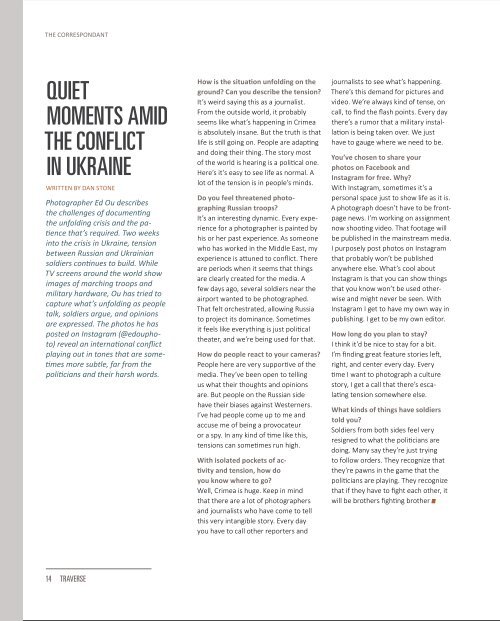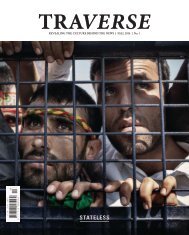Create successful ePaper yourself
Turn your PDF publications into a flip-book with our unique Google optimized e-Paper software.
THE CORRESPONDANT<br />
QUIET<br />
MOMENTS AMID<br />
THE CONFLICT<br />
IN UKRAINE<br />
WRITTEN BY DAN STONE<br />
Photographer Ed Ou describes<br />
the challenges of documenting<br />
the unfolding crisis and the patience<br />
that’s required. Two weeks<br />
into the crisis in Ukraine, tension<br />
between Russian and Ukrainian<br />
soldiers continues to build. While<br />
TV screens around the world show<br />
images of marching troops and<br />
military hardware, Ou has tried to<br />
capture what’s unfolding as people<br />
talk, soldiers argue, and opinions<br />
are expressed. The photos he has<br />
posted on Instagram (@edouphoto)<br />
reveal an international conflict<br />
playing out in tones that are sometimes<br />
more subtle, far from the<br />
politicians and their harsh words.<br />
How is the situation unfolding on the<br />
ground? Can you describe the tension?<br />
It’s weird saying this as a journalist.<br />
From the outside world, it probably<br />
seems like what’s happening in Crimea<br />
is absolutely insane. But the truth is that<br />
life is still going on. People are adapting<br />
and doing their thing. The story most<br />
of the world is hearing is a political one.<br />
Here’s it’s easy to see life as normal. A<br />
lot of the tension is in people’s minds.<br />
Do you feel threatened photographing<br />
Russian troops?<br />
It’s an interesting dynamic. Every experience<br />
for a photographer is painted by<br />
his or her past experience. As someone<br />
who has worked in the Middle East, my<br />
experience is attuned to conflict. There<br />
are periods when it seems that things<br />
are clearly created for the media. A<br />
few days ago, several soldiers near the<br />
airport wanted to be photographed.<br />
That felt orchestrated, allowing Russia<br />
to project its dominance. Sometimes<br />
it feels like everything is just political<br />
theater, and we’re being used for that.<br />
How do people react to your cameras?<br />
People here are very supportive of the<br />
media. They’ve been open to telling<br />
us what their thoughts and opinions<br />
are. But people on the Russian side<br />
have their biases against Westerners.<br />
I’ve had people come up to me and<br />
accuse me of being a provocateur<br />
or a spy. In any kind of time like this,<br />
tensions can sometimes run high.<br />
With isolated pockets of activity<br />
and tension, how do<br />
you know where to go?<br />
Well, Crimea is huge. Keep in mind<br />
that there are a lot of photographers<br />
and journalists who have come to tell<br />
this very intangible story. Every day<br />
you have to call other reporters and<br />
journalists to see what’s happening.<br />
There’s this demand for pictures and<br />
video. We’re always kind of tense, on<br />
call, to find the flash points. Every day<br />
there’s a rumor that a military installation<br />
is being taken over. We just<br />
have to gauge where we need to be.<br />
You’ve chosen to share your<br />
photos on Facebook and<br />
Instagram for free. Why?<br />
With Instagram, sometimes it’s a<br />
personal space just to show life as it is.<br />
A photograph doesn’t have to be frontpage<br />
news. I’m working on assignment<br />
now shooting video. That footage will<br />
be published in the mainstream media.<br />
I purposely post photos on Instagram<br />
that probably won’t be published<br />
anywhere else. What’s cool about<br />
Instagram is that you can show things<br />
that you know won’t be used otherwise<br />
and might never be seen. With<br />
Instagram I get to have my own way in<br />
publishing. I get to be my own editor.<br />
How long do you plan to stay?<br />
I think it’d be nice to stay for a bit.<br />
I’m finding great feature stories left,<br />
right, and center every day. Every<br />
time I want to photograph a culture<br />
story, I get a call that there’s escalating<br />
tension somewhere else.<br />
What kinds of things have soldiers<br />
told you?<br />
Soldiers from both sides feel very<br />
resigned to what the politicians are<br />
doing. Many say they’re just trying<br />
to follow orders. They recognize that<br />
they’re pawns in the game that the<br />
politicians are playing. They recognize<br />
that if they have to fight each other, it<br />
will be brothers fighting brother<br />
14 <strong>TRAVERSE</strong>



